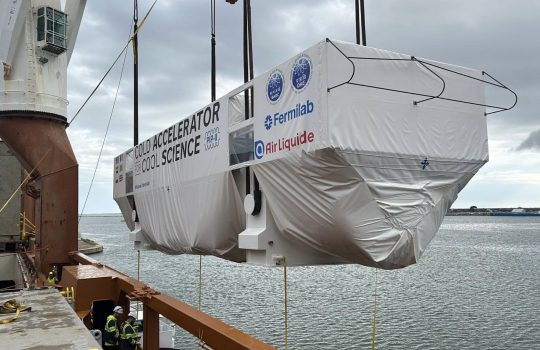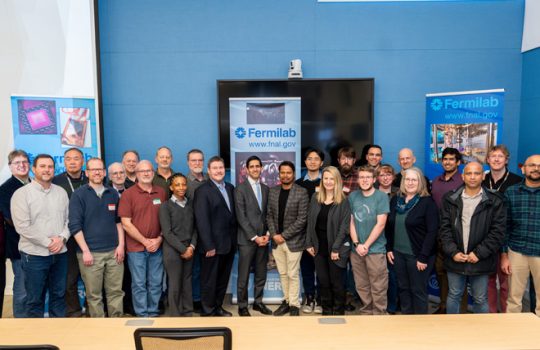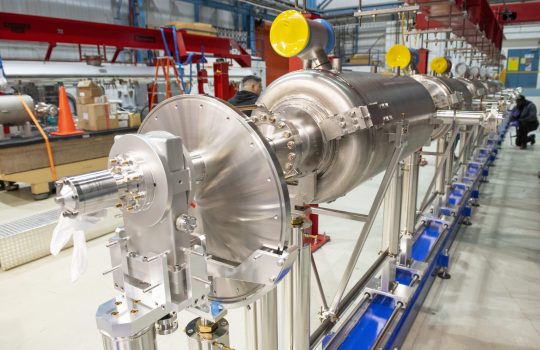The Department of Energy’s Office of Science has awarded three Fermilab projects funding to improve accelerator technologies across a wide range of applications, including accelerator-based scientific research in such fields as particle physics and materials science and uses of accelerators for medicine, industry and defense.
With support from the 2019 DOE Accelerator Stewardship Awards, Fermilab is collaborating with other laboratories, universities and industry to advance accelerator science for the environment, medicine and fundamental physics.
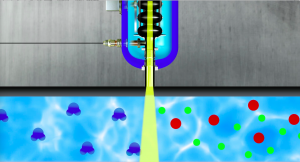
Fermilab is working on a novel technology that would use a portable electron accelerator to decompose water contaminants, possibly resulting in cleaner drinking water. Image courtesy of Charlie Cooper
Electron beam technology for cleaner drinking water
Charlie Cooper
Water providers across the nation are working to upgrade their treatment systems to address a particular set of contaminants that are difficult to remove through conventional methods. Fermilab experts and partners plan to demonstrate a novel technology that uses electron beams to attack these compounds. If effective, the approach, which would use a portable electron accelerator to decompose the contaminants, could result in cleaner drinking water throughout the United States.
Lead institution: Stony Brook University
Partner institutions: Brookhaven National Laboratory, U.S. Environmental Protection Agency
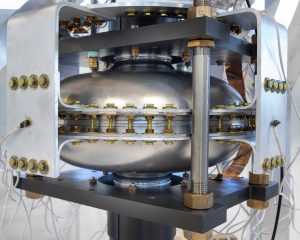
A new technique developed at Fermilab will significantly simplify the conventional accelerator cooling infrastructure. Photo: Marty Murphy
Economical accelerators for environmental applications
Ram Dhuley, Charles Thangaraj
Fermilab scientists, engineers and their partners are designing an economical, superconducting radio-frequency particle-accelerating structure capable of producing high-power, high-energy electron beams for environmental applications. A key to the accelerator’s economy is a new cryocooling technique, which will significantly simplify the conventional accelerator cooling infrastructure that uses liquid helium. The partnership will design the accelerating structure and develop plans to demonstrate the operation of a prototype structure using the cryocooling technique.
Lead Institution: Fermi National Accelerator Laboratory
Partner institution: General Atomics
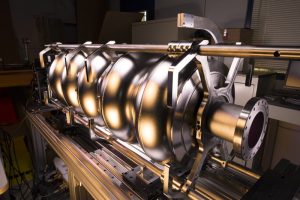
Fermilab scientists and partners are advancing surface treatments for accelerator cavities and methods for keeping cavities tuned to reduce the size and cost of superconducting accelerators. Photo: Reidar Hahn, Fermilab
High-performance, medium-velocity superconducting cavities for linear hadron accelerators
Martina Martinello, Yuriy Pischalnikov
Accelerator cavities are components that impart energy to the particle beam as the beam travels through one cavity after another. Research shows that certain surface treatments of superconducting cavities can boost their efficiency. Keeping the cavities tuned to the right frequencies can also save on operational costs. Fermilab scientists and partners are making headway in both of these areas, specifically for the development of high-performance, medium-velocity cavities for linear hadron colliders. The results of this R&D will directly reduce the size and cost of superconducting accelerators, such as Fermilab’s PIP-II accelerator or Michigan State University’s Facility for Rare Isotope Beams, benefiting both discovery science and medicine.
Lead institution: Michigan State University
Partner institution: Argonne National Laboratory

